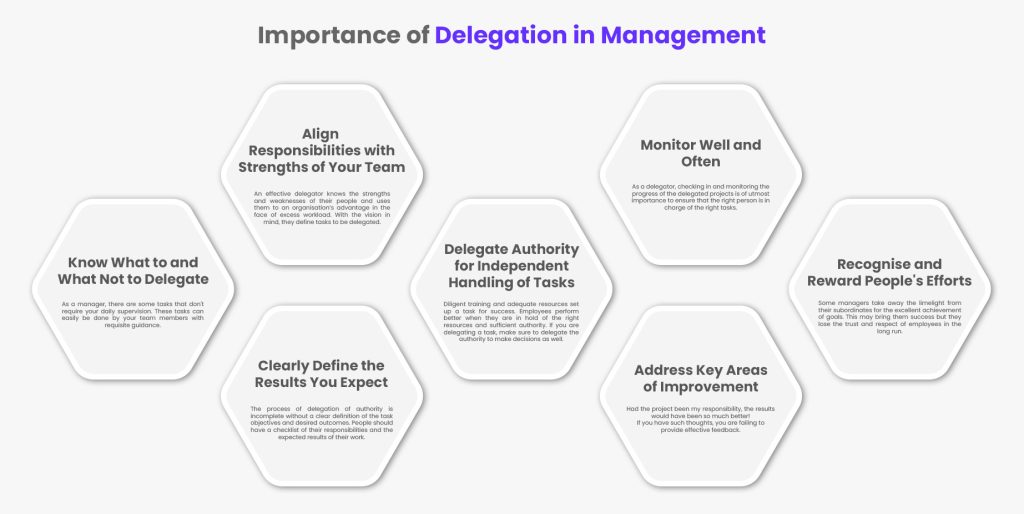
The most important aspect of management is delegation. As a manager, it is impossible for you to do everything on your own. This is where the distribution of jobs and responsibilities among team members come into being. If you’re unsure of how to delegate, read this blog. We will discuss seven effective ways to delegate authority that make the workplace more manageable.
Importance of Delegation in Management
The inability to delegate often stems from one’s reluctance to ask for help. Many managers don’t want to come across as pushy.
The fear of poor commitments and losing control over expected outcomes further burdens their shoulders with added responsibilities.

Delegation is a critical skill that every manager must know. Using this strategic tool, you are not giving up responsibilities but equipping your team members to share the workload, thus attaining managerial efficiency and ensuring your next-level growth in your career ladder.
The steps to delegate authority are as follows:
1. Know What to and What Not to Delegate
As a manager, there are some tasks that don’t require your daily supervision. These tasks can easily be done by your team members with requisite guidance.
Knowing what tasks to delegate is the first step to being an effective delegator. List down all your tasks and evaluate the complexity and urgency of each task. Divide those with less complexity based on the skills and strengths of your people. This displays your trust in your team’s capabilities, boosting their morale and level of engagement.
However, there are some other tasks like strategizing, performance feedback and evaluation that cannot be delegated. These tasks are of utmost importance to the overall outcome of your business. Gradually, train your subordinates based on their potential and skill set to carry out tasks in future that are handled by you today.
2. Align Responsibilities with Strengths of Your Team
An effective delegator knows the strengths and weaknesses of their people and uses them to an organisation’s advantage in the face of excess workload. With the vision in mind, they define tasks to be delegated.
Instead of going wild with the process of delegation, you can discuss with your team members which areas they would like to work in.
Let’s say one of your employees is well-trained in supervision and wants to take up tasks related to planning and supervising. This is a good opportunity to let people take on desired responsibilities that align with their strengths and preferences. Not only will they gain exposure but will also enjoy their work, resulting in reduced employee turnover rates.
Also, there are times when you might have to travel to meet stakeholders and key business partners. Your absence from work should not disrupt day-to-day operations back in the workplace. Smart and effective delegation of responsibilities ensures smooth functioning even during your absence. A good manager is the one who never creates the feeling of his absence even if he is not physically available.
3. Clearly Define the Results You Expect
The process of delegation of authority is incomplete without a clear definition of the task objectives and desired outcomes. People should have a checklist of their responsibilities and the expected results of their work.
The kind of results you expect of them should be crystal clear with a detailed understanding of the desired goal. Encourage open communication to get the right message across and avoid confusions later on.
4. Delegate Authority for Independent Handling of Tasks
Diligent training and adequate resources set up a task for success. Employees perform better when they are in hold of the right resources and sufficient authority. If you are delegating a task, make sure to delegate the authority to make decisions as well.
The constant back and forth frustrates team members and wastes their time. Instead of micromanaging a project later, duly train people in advance and let them do what they find best for the successful completion of tasks.
5. Monitor Well and Often
As a delegator, checking in and monitoring the progress of the delegated projects is of utmost importance to ensure that the right person is in charge of the right tasks.
Not everyone understands or knows how you want them to do a particular task. An information gap can take the person in a position of responsibility off track.
Determine a medium to communicate about the progress of a task more often. This can help build transparency among the team and avoid setbacks later.
6. Address Key Areas of Improvement
Had the project been my responsibility, the results would have been so much better!
If you have such thoughts, you are failing to provide effective feedback.
Offering feedback in the form of appreciation or constructive criticism is necessary to keep your members in touch with reality. It helps align their understanding with your expectations, reducing the likelihood of misunderstandings or errors.
You don’t just have to get the work done. The goal of delegation is to receive a completed task with the best possible results. Give feedback as required to ensure you receive the best version of a task.
7. Recognise and Reward People’s Efforts
Some managers take away the limelight from their subordinates for the excellent achievement of goals. This may bring them success but they lose the trust and respect of employees in the long run.
The best manager will provide the credit to his team members and take the ownership of failures by himself. Recognise the work done by your people and allow them some room to accept their mistakes without the fear of judgment. Appreciation of efforts reinforces good performance and motivates people to continue delivering quality work.
When your employees feel valued, heard and appreciated, they automatically give their best in all the tasks. This is a win-win situation for us.
Summary
Stepping into the shoes of a delegator is not as easy as it sounds. Especially if you are on a tight timeline and have higher expectations from the business. Following the correct approach, delegation is letting responsibilities go into the right hands without affecting the final outcome.
The better you get at aligning the right people with the right tasks and keep encouraging them, the more effective your team will perform.
Follow me on LinkedIn
Frequently Asked Questions
1. Who can delegate authority?
In the times of need, managers have the authority to delegate task responsibilities to their employees and subordinates. The distribution of workload ensures time-effective completion of tasks.
2. Why is there a need to delegate authority?
Delegating authority is essential for a variety of reasons:
1. Delegating authority and responsibilities allows managers and leaders to distribute workload effectively among team members.
2. No one should feel overwhelmed with work. Delegation thus helps managers prevent burnout and maintain work-life balance.
3. By assigning tasks to people with the appropriate skills and experience, tasks are completed more efficiently and to a higher standard.
4. Delegating authority helps organisations prepare for times of adversity. Distribution of decision-making power among different people prepares them to respond more effectively to changing market conditions and customer needs.




This resource is fabulous. The wonderful data exhibits the essayist’s earnestness. I’m stunned and expect more such astonishing substance.
This webpage is unbelievable. The brilliant data reveals the creator’s interest. I’m awestruck and expect further such astonishing sections.
This webpage is phenomenal. The brilliant data reveals the proprietor’s interest. I’m awestruck and expect further such astonishing entries.
awesome